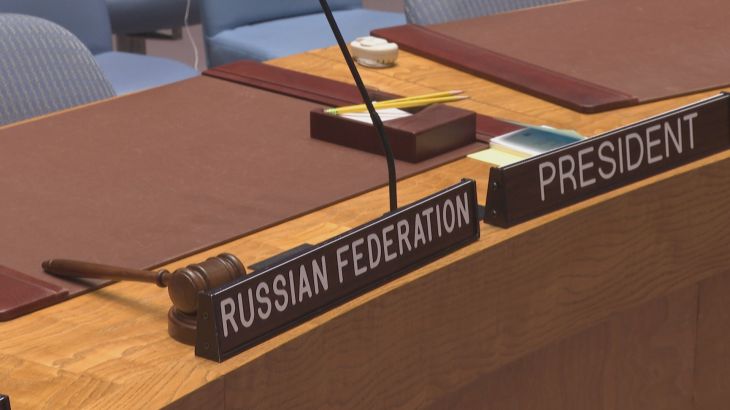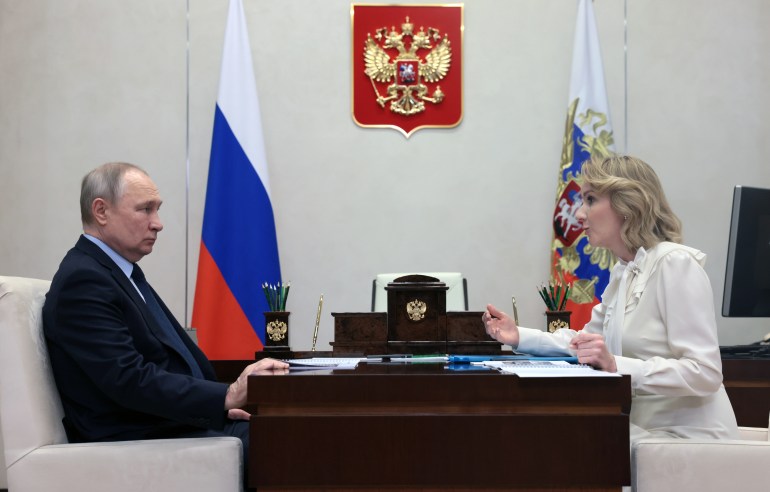Russian official sought by ICC for war crimes speaks to UN
Maria Lvova-Belova will be the lead speaker at an informal meeting of the Security Council about Ukrainian children taken to Russia.

Russia’s commissioner for children’s rights, who is being sought for war crimes, will brief a controversial United Nations meeting that Russia called to counter what it claims is disinformation about Ukrainian children taken to Russia.
Russia’s UN Mission confirmed on Tuesday that Maria Lvova-Belova will be the lead speaker, by video link, to an informal meeting of the Security Council that has sparked opposition from Ukraine’s supporters.
Keep reading
list of 4 itemsWho was fighter-turned-blogger Tatarsky and why was he killed?
Finland joins NATO as Russia’s war rages on in Ukraine
Russia-Ukraine war: List of key events, day 406
The International Criminal Court (ICC) issued arrest warrants last month for her and President Vladimir Putin over their suspected involvement in the unlawful deportation and transfer of children from occupied areas of Ukraine to Russia.
The United Kingdom said it has blocked outside broadcast of the meeting in protest and will not send an ambassador. The US mission said it will not send its ambassador, either.
“The fact that they are inviting someone indicted by the ICC speaks for itself,” UK deputy ambassador James Kariuki said.

Later, the UK mission added in a statement: “If she wants to give an account of her actions she can do so in The Hague,” the Netherlands city where the ICC has its headquarters.
The Associated Press reported on Lvova-Belova’s involvement in the abduction of Ukrainian orphans in October, in the first investigation to follow the abduction process all the way to Russia, relying on dozens of interviews and documents.
It found the open effort to put Ukrainian children up for adoption in Russia was well under way. Ukrainian officials claimed at the time that nearly 8,000 children had been deported to Russia, but the exact number was difficult to determine.
When it announced the warrants on March 17, the ICC alleged Putin and Lvova-Belova were responsible for the war crime of unlawful deportation and transfer of children from occupied areas of Ukraine into Russia.
Their chances of facing a trial are remote as Moscow does not recognise the court’s jurisdiction. Kremlin spokesman Dmitry Peskov at the time called the ICC action “legally void” and “outrageous and unacceptable”.
‘Baseless and illogical’
Other speakers expected to address the informal Security Council meeting are the adviser on humanitarian programmes in Lvova-Belova’s office and the commissioners for human rights and children’s rights in Ukraine’s eastern Donetsk region, which is partly Russian occupied.
Russia’s UN mission said Wednesday’s meeting is aimed at providing “objective information” about children in conflict areas in the eastern Donbas, which includes Donetsk, and Russian measures to evacuate them from danger.
The mission claimed Western media and some delegations misrepresented the evacuations as “abduction”, “forced displacement”, and “adoption” and said Russia was attempting to destroy their Ukrainian identity.
“Such a position is not only baseless and illogical, it is also inhumane as it virtually calls for leaving orphaned or uncared-for children in the midst of hostilities,” the mission’s statement said.
Poland’s UN Ambassador Krzysztof Szczerski, whose country is a close ally of Ukraine, told reporters having Lvova-Belova brief the council “is not appropriate”.
“We have to treat seriously the ICC’s arrest warrants,” he said. “So it’s surely not the person to describe the atrocities and horrors of the children being kidnapped and brought by force to Russia.”
On Tuesday, Lvova-Belova told a press conference in Moscow she was ready to send deported children back to Ukraine if their families requested it.
According to a report from her office, 16 children from nine families have been reunited with their relatives living in Ukraine or elsewhere since March 29. She, however, refused to publish a complete list of Ukrainian children brought to Russia.